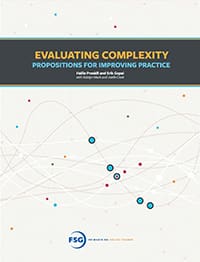While evaluation has traditionally focused on assessing programmatic impact according to pre-determined indicators, a new approach is needed for evaluating complex initiatives, as well as initiatives operating in complex environments where progress is not linear, predictable, or controllable. Nine propositions can help evaluators navigate the unique characteristics of complex systems, improve their evaluation practice, and better serve the needs of the social sector.
Top Takeaways
- In light of the complexity of social change, evaluations should remain iterative, consider all aspects of the system, support learning across the system, adapt to the local context, search for effective principles, identify sources of influence across the system, focus on relationships and interdependencies, explain variations in an initiative’s outcomes, and watch for emerging patterns.
- Several initiatives illustrate how evaluation approaches can recognize and respond to complexity, including the Challenge Scholars program in Grand Rapids, The California Endowment’s Building Healthy Communities strategy, and the Norlien Foundation’s Alberta Family Wellness Initiative.
- When assessing complex initiatives, evaluators can enhance data collection and use through a range of tools and methods, including systems mapping, social network analysis, reflective practice, interviews, learning memos, and many others.
Watch the Webinar



